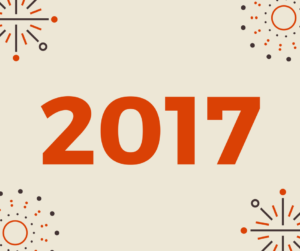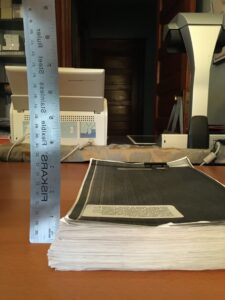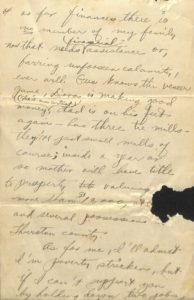 I originally wrote this blog post in November 2015. I thought it might come in handy for those of you looking to get your ducks in row for the new year. Having a clear desk can give your productivity a huge boost. If you haven’t seen the surface of your desk in awhile, here are the steps you can to get it clear. After you’re done, take just a few minutes at the every research session to put everything away.
I originally wrote this blog post in November 2015. I thought it might come in handy for those of you looking to get your ducks in row for the new year. Having a clear desk can give your productivity a huge boost. If you haven’t seen the surface of your desk in awhile, here are the steps you can to get it clear. After you’re done, take just a few minutes at the every research session to put everything away.
If you can’t remember the last time you saw your desktop in your genealogy research space, perhaps it’s time to experience the joy of a clean desk. I know that time to do genealogy research is limited for most people and the last way you want to spend your precious genealogy time is on cleaning up your desk. But it’s worth it. When you sit down at a clear desk, your mind is more clear and you can be more focused on your research.
But there’s good news: It doesn’t have to be hard or time consuming. Here’s a step-by-step suggestion for creating some order on your desk, swiftly.
- Set your timer for 25 minutes.*
- Clear everything off your desk (and I mean everything except, perhaps, your computer). Put like things together into rough categories as you go. (For example, put papers together in a pile on the floor near your desk; put office supplies together, etc.) It might be helpful to have some bankers’ boxes or plastic totes handy to hold the categories, but the floor will do too.
- Put away the items that already have homes. For example, put binders and books where they belong. If something belongs in another room, put it in a box or bin that you’ve marked “Relocate to another room” so you don’t wander away from the room you’re working on. At the end of the session, you can put all that stuff away.
- Go through the non-paper items and put back on the desk those things that deserve to take up such prime real estate. Only those things you use every research session should be placed within arms’ reach when you’re sitting at your desk (with the possible exception of items that give you great pleasure to look at). Relocate or discard the other non-paper items that were on the desk.
- Take all those papers and put them in a box of some sort. Mark that box “Backlog.” (I use a box similar to this one from IKEA for that purpose and I place that box on a shelf.)
- Every time you’re at your desk, set a timer for ten minutes and go through the papers in the backlog, discarding, scanning and/or filing as required. Do this ten minutes a day for as long as it takes to eliminate the backlog. (You might be surprised how few of these short sessions it takes.)
- Don’t add to the backlog box. Instead, at the end of each research session take the time (probably less than five minutes) to clear off your desk and put everything away. That way, you’ll start each session fresh.
* When your timer goes off, stop what you’re doing and take a five-minute break. Then set it for another 25 minutes and get back to work, unless you’re done.
 I’ve been giving some thoughts to the goals I want to set for my genealogy research for next year. I’m a big goal setter and I’ve written posts about my genealogy goals for
I’ve been giving some thoughts to the goals I want to set for my genealogy research for next year. I’m a big goal setter and I’ve written posts about my genealogy goals for 
 I had a wake-up call this morning. My one-year-old standard poodle, Bix, and I came down to my office to start work for the day. No sooner had I sat down at my computer when I heard him chewing on something. Thankfully I didn’t ignore the sound like I sometimes do; I immediately investigated. There was Bix, lying on the floor chewing on page 34 of
I had a wake-up call this morning. My one-year-old standard poodle, Bix, and I came down to my office to start work for the day. No sooner had I sat down at my computer when I heard him chewing on something. Thankfully I didn’t ignore the sound like I sometimes do; I immediately investigated. There was Bix, lying on the floor chewing on page 34 of 